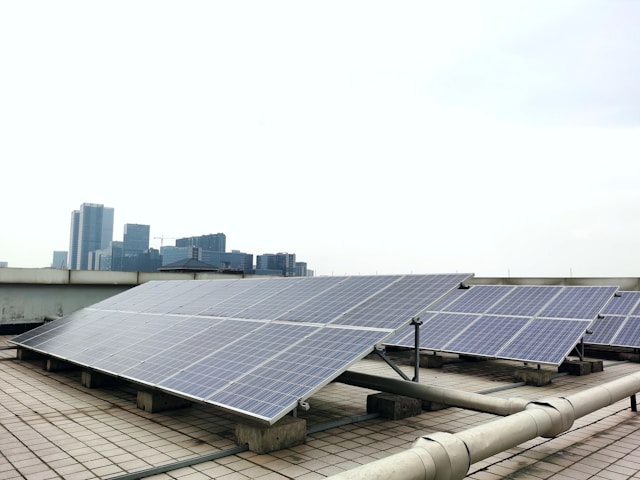In today’s business landscape, sustainability is more than a buzzword; it’s a vital strategy for longevity and success. As we navigate the complexities of climate change and resource scarcity, businesses are increasingly recognized for their products and services and their environmental stewardship. The transformation towards energy-efficient operations stands as a cornerstone in the greening of enterprises. This commitment reduces environmental impact and offers significant economic and social benefits, reinforcing the importance of sustainability in business practices.
Understanding Energy Efficiency
Energy efficiency refers to using less energy to perform the same tasks, thus eliminating energy waste. For businesses, this means more than just cutting costs; it’s about creating a sustainable model that supports long-term growth and stability. Energy-efficient practices range from simple measures like upgrading to LED lighting and implementing smart thermostats to more complex system overhauls such as improving building insulation and installing advanced HVAC systems. These changes can significantly reduce a business’s carbon footprint and energy expenses, proving that what is good for the planet is also good for the bottom line.
The Power of Solar Energy
Adopting renewable energy technologies is a particularly transformative approach to achieving energy efficiency. Commercial on-site solar power systems represent a compelling opportunity for businesses to drastically reduce their reliance on non-renewable energy sources. Solar power allows businesses to generate clean electricity, drastically reducing their electricity bills and protecting them against rising energy costs. Furthermore, with the decreasing cost of solar technology and various financial incentives governments offer, solar installations have become more accessible and financially viable.
Investing in solar power helps companies reduce emissions and showcases their commitment to sustainable development. Facilities adorned with solar panels send a powerful message to customers, stakeholders, and the community about the company’s dedication to environmental responsibility. This strengthens the brand and contributes to a global movement towards renewable energy, setting a positive example for others in the industry.
Corporate Responsibility and Consumer Expectations
The wave of digital transformation sweeping across industries also presents a unique opportunity to enhance energy efficiency. Innovative digital tools and platforms enable businesses to analyze vast amounts of data regarding their energy consumption, identify inefficiencies, and implement more effective energy management strategies. For instance, cloud-based analytics can monitor energy usage patterns across multiple locations, providing insights that drive more innovative, targeted energy conservation measures.
This optimizes energy use and aligns with the growing consumer expectation for businesses to adopt transparent and proactive environmental practices. Integrating digital technologies streamlines operations and significantly amplifies a business’s ability to reduce environmental impact while maintaining a competitive advantage in a technology-driven marketplace.
Strategic Planning and Investment
Transitioning to more energy-efficient operations requires strategic planning and investment. While the initial costs can be substantial, the long-term savings and benefits are undeniable. Businesses must conduct thorough energy audits to identify the most effective ways to save energy and reduce costs. These audits can help pinpoint specific areas where energy is being wasted and where improvements can be made. Additionally, many governments offer grants, tax breaks, and other incentives to encourage businesses to embrace energy efficiency. Leveraging these financial tools can make the transition more manageable and economically attractive.
Leveraging Technology and Engaging Employees
Furthermore, technology plays a pivotal role in enhancing energy efficiency. Advances in automation and the Internet of Things (IoT) have led to the development of smart buildings and smart grids, which optimize energy use and improve operational efficiencies. These technologies allow businesses to monitor and control energy consumption in real-time, enabling proactive management of energy resources.
Employee engagement is also crucial in fostering a company’s sustainability culture. Training staff on the importance of energy conservation and how to implement it in their daily work can significantly reduce energy use. Moreover, involving employees in the company’s sustainability goals can increase job satisfaction and staff retention, as they feel they contribute to a worthwhile cause.
Leading by Example
Finally, greening businesses is not just a responsibility but also an opportunity to lead. Companies that embrace this journey can influence their peers and contribute to a broader societal shift toward sustainability. Small steps lead to significant changes. Each sustainable practice adopted by a business benefits the environment and sets a benchmark for others in the industry. As more businesses recognize the benefits of being energy efficient, we can expect a ripple effect, leading to widespread environmental and economic gains. This positive change fosters a healthier planet and more resilient economies.
Conclusion
Greening your business through energy efficiency is not just an environmental act but a strategic business decision offering extensive benefits. The advantages are clear, from cost savings to improved operational efficiency to enhanced corporate reputation and customer loyalty. As we look towards a sustainable future, energy-efficient businesses will be pivotal. Companies can secure a resilient, profitable, and environmentally conscious tomorrow by investing in sustainable practices today.







